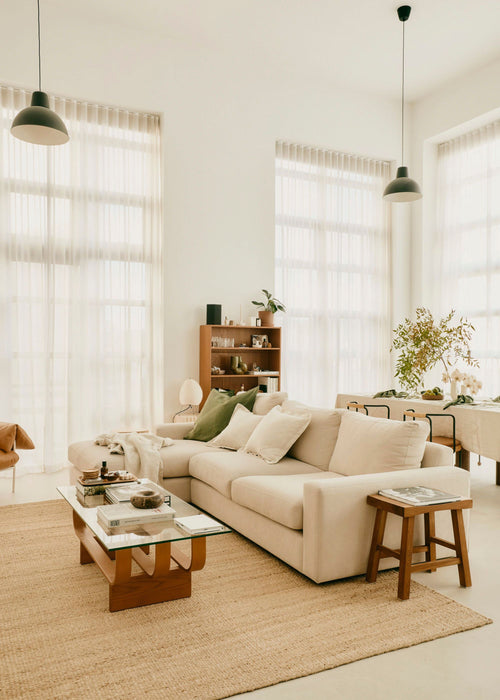
How to Style a Bed
Find out exactly how to style a bed. This ultimate guide will talk you through everything you need to consider for bed styling and beyond.
Transforming your bed into a stylish centrepiece is easier than you might think. In this comprehensive guide, we’ll walk you through essential tips and techniques for perfecting your bed’s look, from understanding the basic bedding choices to picking the right colours and accessories to style your bed.
Whether you're debating between quilts and duvets, selecting the perfect sheet material, or arranging pillows to achieve the ideal aesthetic, this guide will equip you with everything you need to create a bed that’s not only comfortable but visually stunning.
Covered in this guide:
Finding the Right Bedding
Before you decide how to style your bed, get to know which major bedding options you have. Different kinds of blankets are often used for different bedding styles, so your choice between a classic quilt or a fluffy duvet set may have a big impact on your overall bedding look.
Difference between quilts vs. duvets
One of the first decisions to make when styling your bed is the eternal question of quilt vs duvet. Which one is better for your bed, and which should you be using? Here’s a closer look at these cosy, comfy blanket styles to help you compare their different benefits and limitations.
Duvets
Duvets are versatile, easy-to-clean bedding options that can be updated with different covers to suit any style.
- What it is: A blanket filled with insulating material (down feathers, wool, cotton, or synthetic) designed to be used with a duvet cover.
- How to use: Pair with a duvet cover, which can be easily swapped to change the bedroom’s aesthetic.
- Pros:
- Easy to clean.
- Versatile in style.
- Luxurious look.
- Can easily update the room by changing covers.
- Cons:
- The duvet insert may move within the cover, requiring clips, ties, or buttons to keep it in place.
- Requires two pieces (duvet cover and insert).
- Not always suitable for warm weather.
Quilts
Quilts (or quilted bed covers) are a traditional, versatile bedding option that can be used year-round, either on their own or layered with other bedding.
- What it is: A single-piece blanket with an insulating filling and a fabric shell on both sides.
- How to use: Use as a lightweight cover in warmer months or layer with other bedding for extra warmth in winter. Best paired with a flat sheet.
- Pros:
- Adaptable for all seasons.
- Can mix and match textures and colours.
- Provides a weighty feel.
- One piece.
- Easily layered for more warmth.
- Cons:
- Doesn’t offer the same lofty, soft appearance as a duvet set.
- Not as fluffy/cosy.
- Anytime you want to change the look, you need to buy an entirely new quilt.
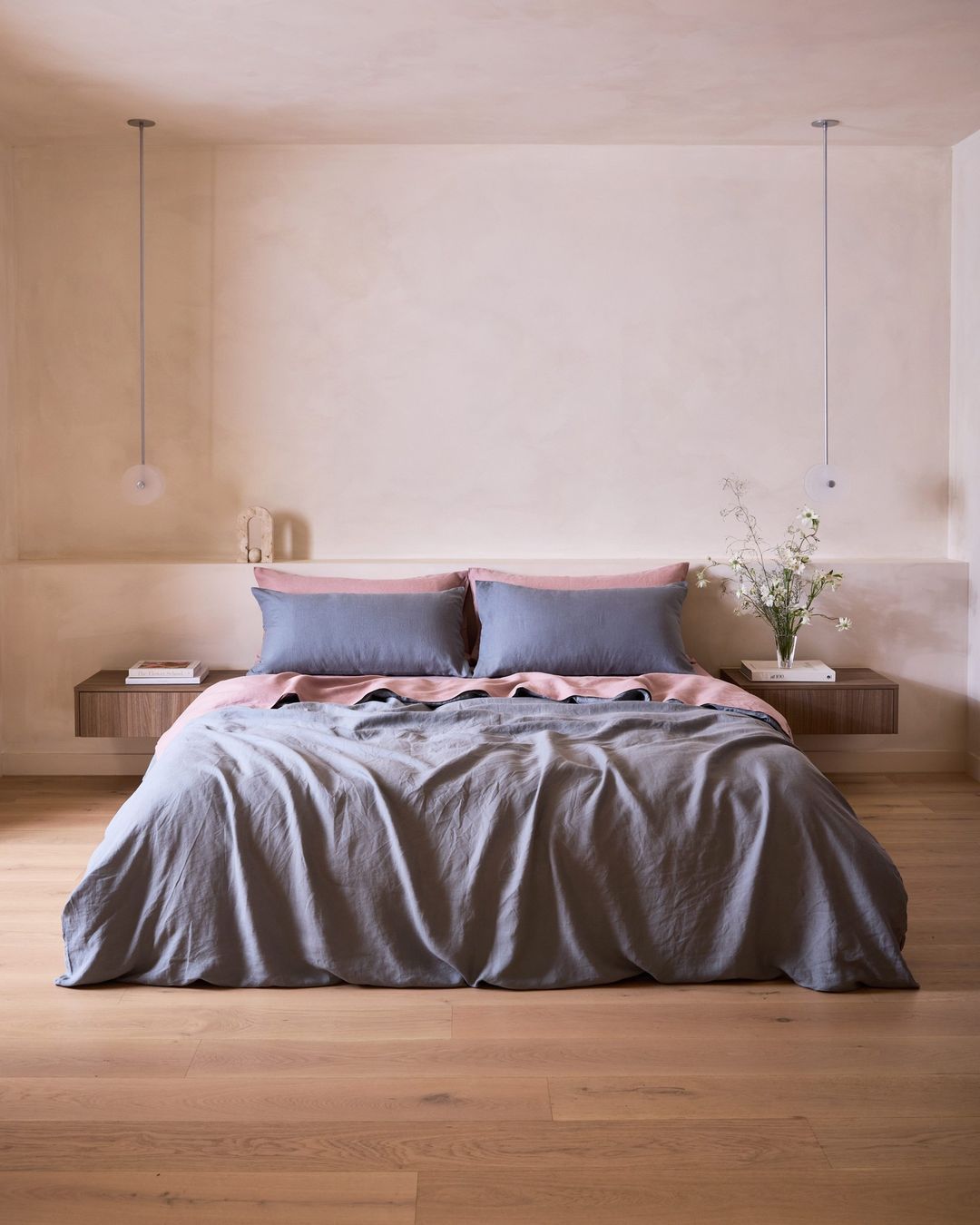
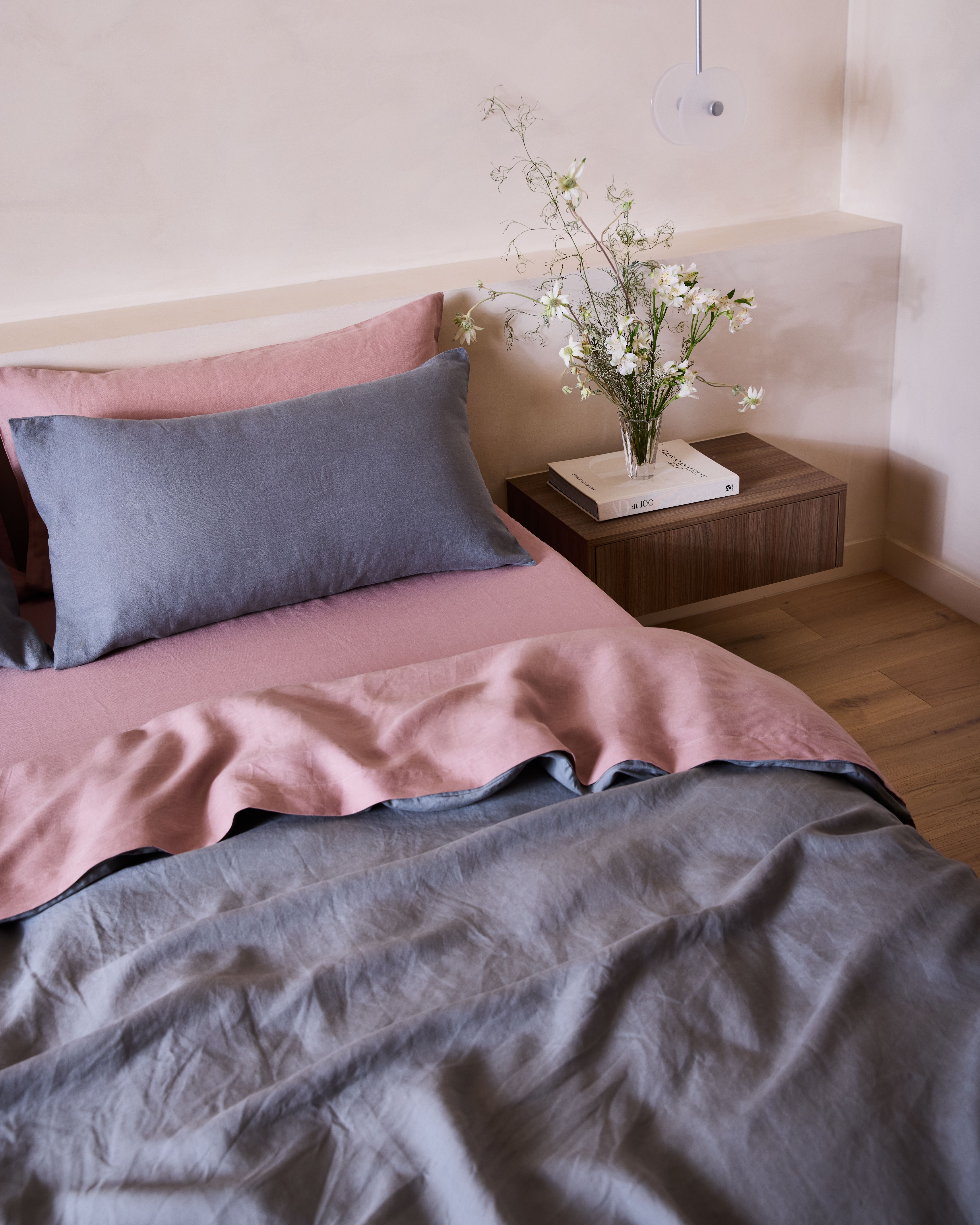
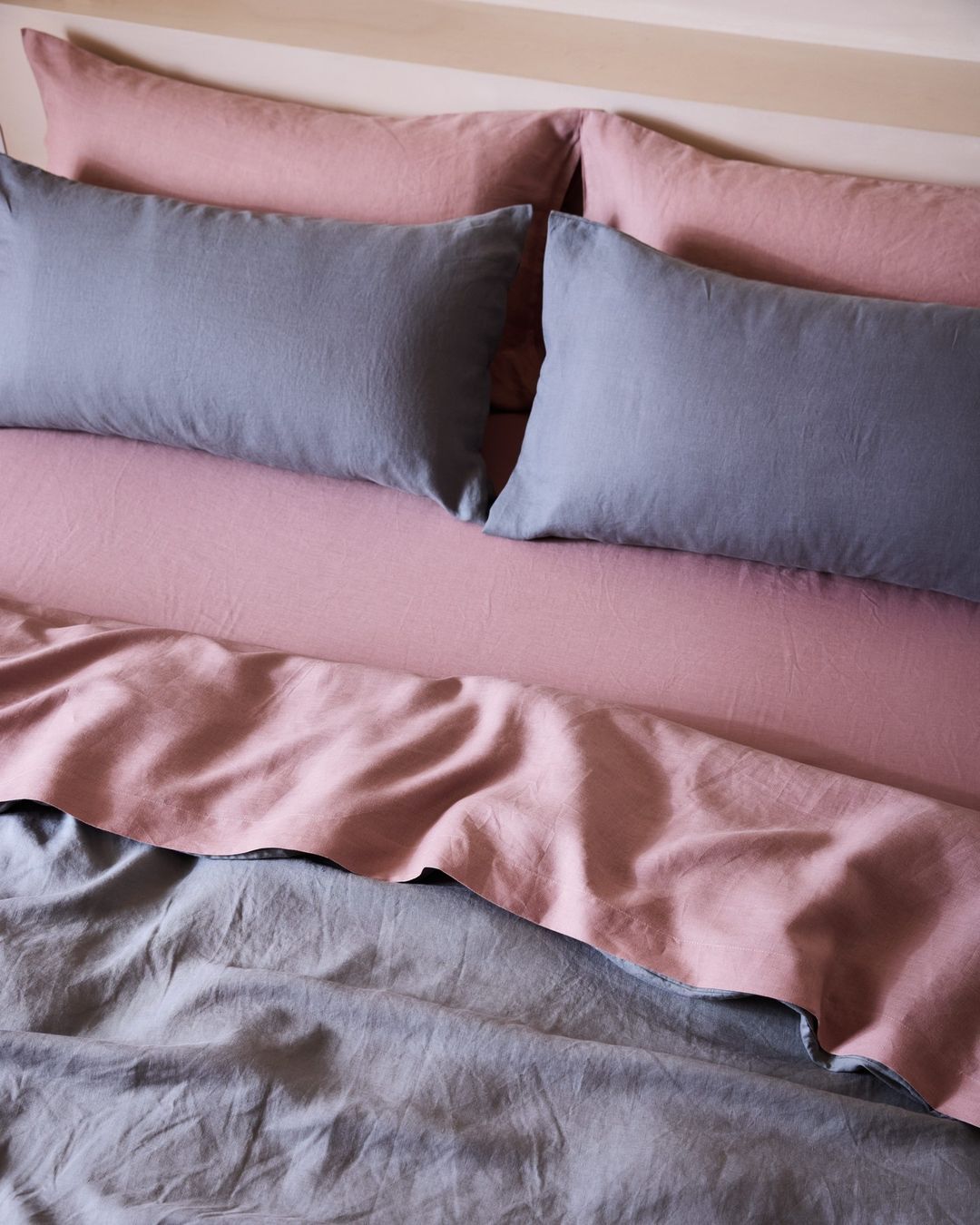
Choosing Bedding Colours
The colour palette of your bedding can significantly impact the mood and style of your bedroom. Here are the most important things to consider when choosing bedding colours.
What to consider when choosing bedding colours
- Bedroom furniture: Start by thinking about the furnishings in your bedroom. When you pick out your bedding, you could opt for lighter colours that complement or match these tones to create an open, spacious and minimalist look.
- Dominant bedroom colours: This might include the colours of your walls, ceiling, furniture and flooring. You can match your bedding to the primary colours of your bedroom to create a cohesive overall colour scheme for your space. Alternatively, go for a dynamic approach and make your bedding contrast with the main tones in the room.
- Bedroom lighting: The lighting in your room impacts how colours appear in the space. If your room has plenty of natural light, bolder, darker shades can have a salient impact without looking too intense. On the other hand, if your room has limited natural light, warmer tones or lighter colours can help to brighten up the space and make it feel more welcoming.
How to choose bedding colours
When selecting bedding colours, it's important to choose shades that reflect your personal style and create an environment you want for restful sleep. While trends offer plenty of inspiration, from bold retro reds to soothing pastels, finding the right colour is ultimately about what makes you feel most at home.
Consider muted tones like lavender or sage for a calming atmosphere, especially if you struggle to fall asleep. Alternatively, rich tones like charcoal can enhance a darker sleeping space. Explore the biggest colour trends of 2024 or take this quiz to discover your dream bedding colour.
Sheet Materials and Sizing
Styling starts with the sheets, so making sure that you choose the right sheet material and size will set a good foundation upon which to build your overall bedding look.
What is the best material for bed sheets?
Your bed sheet material can determine the look and feel of your bedding, so it’s important to pick a fabric that suits your style and sleep preferences.
- Cotton: This material is a popular choice for bed sheets thanks to its natural softness and ease of care. They’re comfortable to use across a range of climates and can be ironed to create a neat and polished, hotel-style look for your bed.
- Linen: Flax linen is the best material for luxury bed sheets, combining a relaxed, ‘lived-in’ look and effortless style with buttery softness. Linen sheets are also suitable across a range of climates and are highly breathable, making them perfect for staying cool during warm summer nights even if you’re a hot sleeper.
- Silk: Silk sheets offer a luxuriously soft feel, reduce skin irritation, and minimise hair tangling. They also have natural hypoallergenic properties and can enhance overall sleep quality.
While each material has its benefits, linen sheets excel in providing a luxurious look, superior breathability, and comfort across different climates, making it an outstanding choice for a stylish and restful night's sleep.
How to choose the right sheet size
Selecting the correct sheet size involves knowing your mattress dimensions and considering how you want your top sheet to fit. Check out bedding sizing before ordering sheets or duvets to make sure you select the correct size.
- Standard Sizes:
- Bed sheets typically fit standard bed sizes
- Twin
- Twin XL
- Full
- Queen
- King
- Cali King
- Bed sheets typically fit standard bed sizes
- Mattress Height:
- Mattresses vary in height; measure your mattress height before choosing sheets.
- Fitted sheets usually have a pocket depth of 30-40 cm to fit different mattress heights.
- Top Sheet Consideration:
- Top sheets are larger than the mattress surface; can be tucked for a polished look or draped for relaxed elegance.
Do you need a top sheet?
Deciding whether to use a top sheet depends on your comfort preferences and desired bedding style.
- Comfort and convenience:
- The choice to use a top sheet is based on personal comfort and styling preference.
- Styling with a top sheet:
- Adds an extra layer of colour and texture to your bedding.
- Can be draped or folded for different aesthetic effects.
- Minimalist look without a top sheet:
- Creates a subtle, minimalist style by using only a duvet cover and fitted sheet.
- Focuses on pillows, duvets, or comforters as the main visual elements.
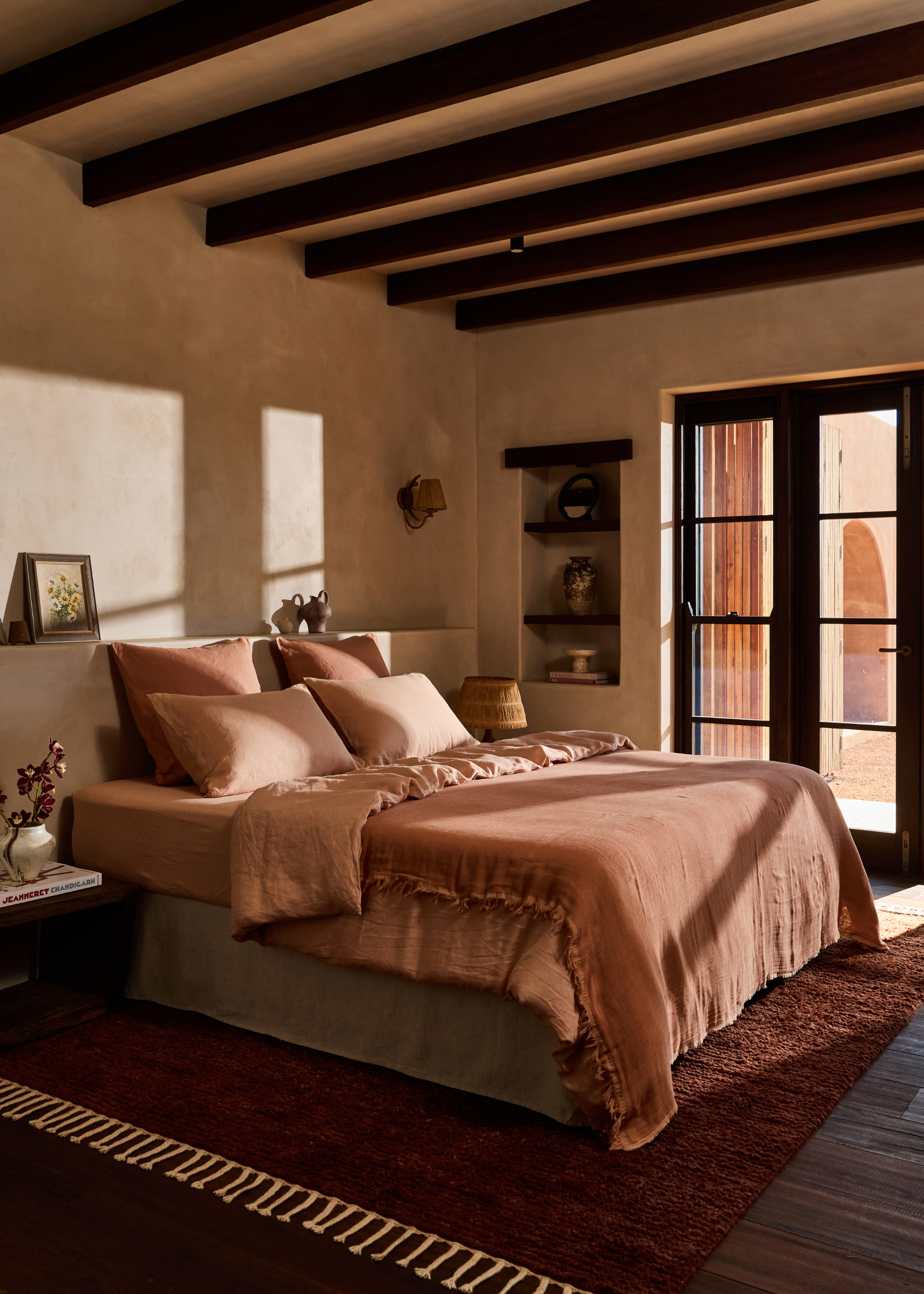
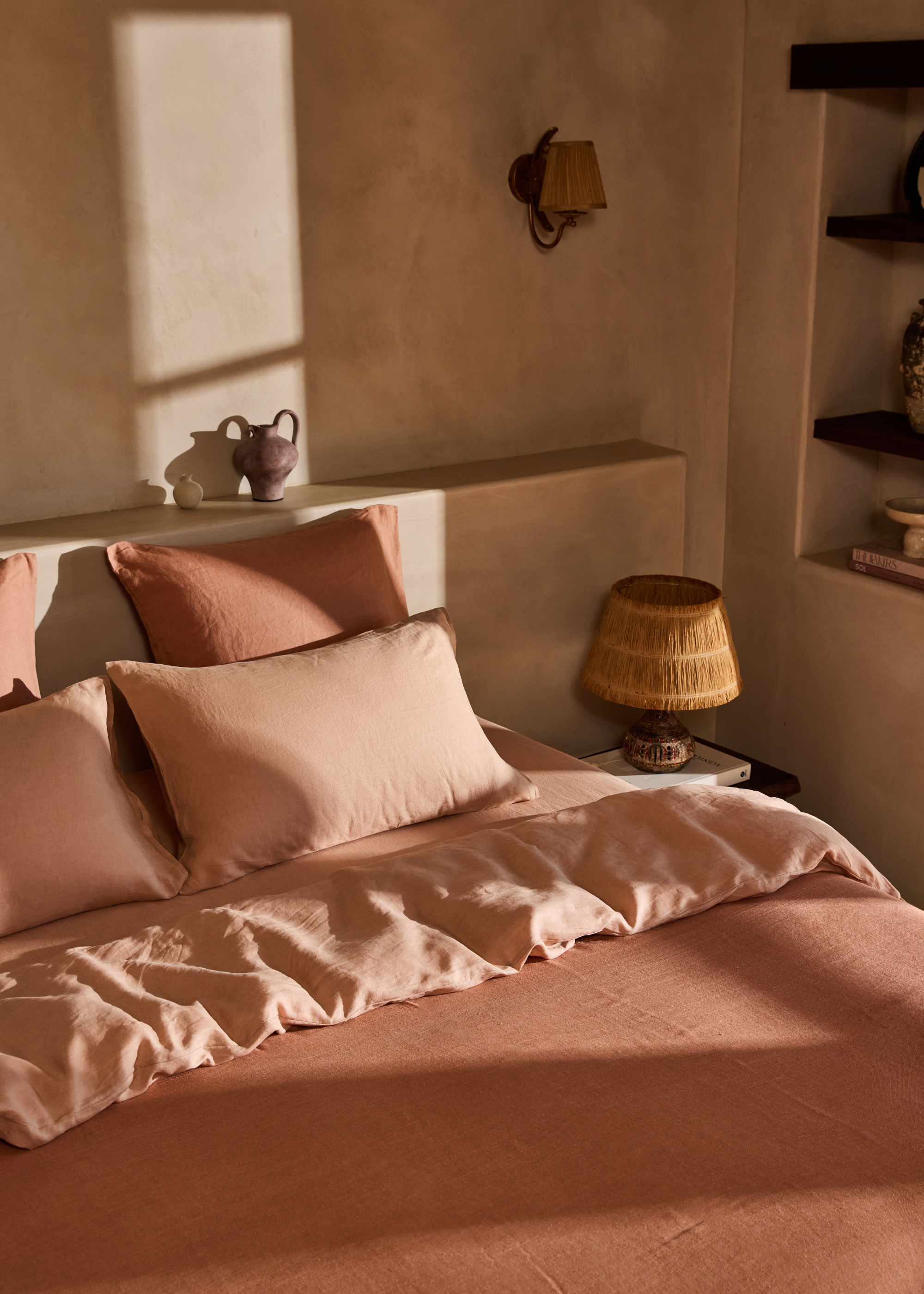
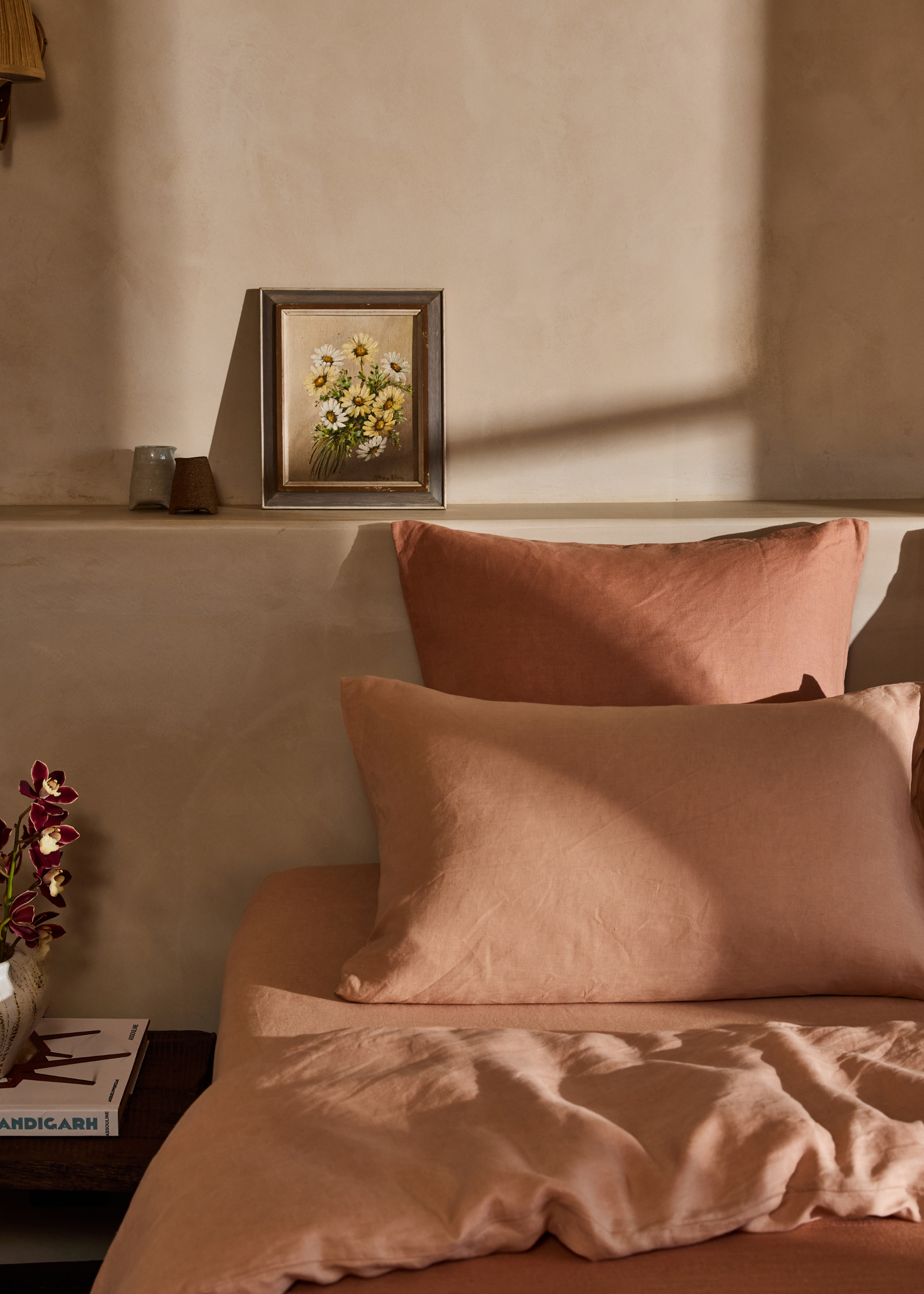
Styling a Bed With Pillows
Pillows aren’t just essential for comfort. They also play a key role in styling your bed and can add colour, texture and visual layers to your bedding. Here are the most important factors to consider when picking out the pillows for your bed.
How many pillows to use on a bed
There’s no single answer for how many pillows to use on your bed for an ideal setup. The right number for you will depend on how you sleep comfortably and which style elements you want to use in your bedding. First, consider the various shapes and styles of pillows that are available
- Standard pillows: Standard pillows are everyday pillows for sleeping. They’re most often rectangular pillows but come in different sizes, materials and depths, depending on your preferences. You might style your bed using between two and six standard pillows.
- European pillows: These are large, square decorative pillows that serve as a backdrop for other pillows and can help create a structured look at the top of the bed. Two European pillows are ideal for a queen or king-sized bed.
- Decorative cushions: These include smaller pillows that ornament your bed. They can come in different shapes, textures and sizes and could be plain, tasselled or structured, depending on what style you’re after. You could use a single decorative cushion or many, depending on their size, shape and style.
Once you’ve decided which pillows you’re using to make your bed, you’ll have a better idea of the total number you need. For example, if you’re using all three of these pillow types to style your bed, you might end up with anywhere from five pillows for a relaxed arrangement to nine or ten for an opulent bedding style.
How to arrange and layer pillows
Once you’ve decided which pillow styles and colours you want for your bed, it’s time to start arranging them. There’s plenty of flexibility in styling your bed, and it’s easy to try different arrangements or experiments to find the best setup for your bed. Here’s a simple, stylish way to arrange your pillows.
- Larger pillows at the back: Place European shams or other large pillows at the back of your pillow arrangement. You can align the edges of these pillows with the bed or place them with a corner pointing upwards for added height.
- Sleeping pillows in the middle: Layer your standard pillows in front of the larger ones. You can stand these pillows on their edges at an angle or lay them flat.
- Finish with decorative pillows: Place your decorative cushions at the front of your pillow set for a pop of colour or texture. Experiment with different colour arrangements to achieve a look that you like.
How to Style Quilts and Throws
Once you’ve built your bedding arrangement the way you like it, quilts and throws can be a great way to top it off. This can bring a splash of colour to your bedroom or tie together the overall look of your bedding.
Quilt vs. Throw
Quilts and throws can both be used as ornamental layers for your bedding. However, there are some important differences between these bedding items to consider before using them to style your bed.
- Quilts: Quilts are a thicker, ornamental blanket, and can add a significant amount of warmth to your bedding. You can use a quilt like a bedspread or extra blanket to cover most of your bed or fold it down the middle to cover only the lower section. The added warmth and flexibility make quilts a bedding favourite for many different styles.
- Throws: Throws are single-piece blankets and are significantly lighter than quilts. They can be used to give your bedding a neat style or a cosy look or to make your bed the focal point of your bedroom.
How to style with a throw blanket
When selecting a quilt or throw to top your bedding, consider how its colour might contrast or complement its surroundings. If you’re going for a subtle, minimalist approach, pick a lighter-toned throw blanket that neatly complements the colours of your bedding, bedroom furniture, walls and flooring.
Alternatively, you could use your throw blanket as an accent piece by picking a colour that strongly contrasts with your bedroom colours.
You can also arrange your throw blanket in different ways depending on the kind of style you want. For a neat look, fold your throw blanket and lay it evenly over the foot of the bed. The sides can be tucked in for a tidy style or left to drape elegantly down the sides of the bed.
For a more relaxed look, allow your throw blanket to fall in natural ripples and bunches at the foot of your bed, and consider laying it more to one side of the bed than the other. This creates a cosy, inviting style for your bed.
Style Your Bed With Pure Linen
Enjoyed This?
Explore more styling inspo.











